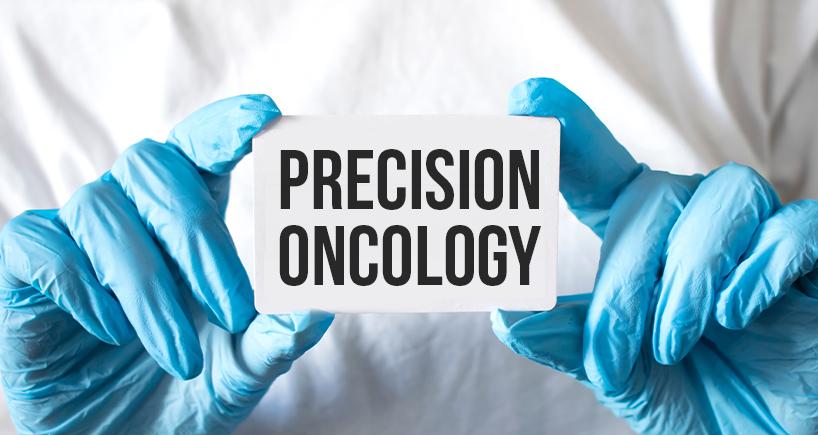
Precision Oncology vs Conventional Oncology
Cancer, a word that brings fear and anxiety, has been a significant adversary of human health for decades. But today, I want to shine a hopeful light on the subject by introducing you to the revolutionary field of precision oncology, a discipline that has shown substantial promise in the management and treatment of stage 4 cancer.
Conventionally stage 4 cancer has been considered a terrifying state, and most patients have anticipated survival of only a few months and the toxicity associated with intensive chemotherapy. However, the world has moved forward in the past 2 decades, and precision oncology promises a better outcome for every patient with significantly lower toxicity.
Difference Between Conventional Oncology and Precision Oncology
Imagine the conventional approach to treating cancer as using a bomb to kill a terrorist - it works broadly and isn't always specific. Traditional methods, like chemotherapy, often affect both the cancer cells and normal cells. While they are often effective, these therapies can lead to significant side effects.
On the other hand, precision oncology is like a smart sniper, pinpointing and attacking only the cancer cells. It revolves around the idea of personalized medicine, understanding that each patient's cancer is unique, as are their responses to treatments. Precision oncology targets specific genetic mutations or changes in the DNA of cancer cells, making treatment more effective and less harmful to the patient's overall health.
Steps to Precision Oncology
In precision oncology, the journey begins with an intricate understanding of the patient's unique cancer profile. Let's break down the steps involved:
- Diagnosis: Just as with conventional treatment, the process starts with diagnosing cancer using various methods like scans and biopsies.
- Genetic Sequencing: The real game-changer step. Here, scientists sequence or "read" the DNA of the cancer cells from the biopsy sample. This analysis identifies specific mutations or changes that make the cancer cells different from normal cells.
- Identifying Targets: Using the results of the genetic sequencing, the oncologists identify unique targets (those specific mutations) in the cancer cells that can be attacked by targeted therapies.
- Choosing Therapy: After identifying the targets, the medical team determines the most appropriate therapy - which could include targeted drugs, immunotherapy, or other precision treatments.
- Monitoring: Once the treatment starts, the patient's response is continually monitored. If the cancer doesn't respond or develops resistance, the process may be repeated to find new targets and therapies.
Advantages of Following a Precision Approach in Stage 4 Cancer
The advancements in precision oncology have been a game-changer for patients with stage 4 cancer. Here are some significant advantages:
- Effective Treatment: Precision oncology's ability to target specific genetic mutations allows for more effective treatment, which can control or even shrink tumors that have spread throughout the body.
- Minimized Side Effects: Because these therapies specifically target cancer cells, they often result in fewer side effects compared to conventional treatments.
- Better Quality of Life: With more effective treatment and fewer side effects, patients can often maintain a better quality of life, even in the advanced stages of cancer.
- Informed Decision Making: The genetic profiling of the cancer provides detailed information about the prognosis and potential response to various treatments. This data empowers patients and doctors to make more informed decisions about their treatment plan.
Examples
We can discuss precision oncology's positive impact can be understood better through some real-life examples:
- Lung Cancer: A patient was diagnosed with stage 4 lung cancer, and his cancer DNA was sequenced and it was realized that he had a mutation in the ALK gene. ALK gene inhibitors are now easily available in India, and they generally produce deep, durable remissions lasting for many years. Instead of chemotherapy, the patient received an oral tablet and his cancer quickly went into complete remission. Today, the patient has survived for more than 8 years and is still taking only a single tablet per day.
- Colon Cancer: A person was diagnosed with stage 4 colon cancer, which was initially devastating news. But when the genetic sequencing of the cancer cells was done, it was found to be Microsatellite Instability-high (MSI-H), a condition that causes the cancer cells to have thousands of genetic mutations. This unique attribute made the cancer more visible and hence more vulnerable to the body's immune system. The individual was given an immunotherapy treatment, pembrolizumab, designed to enhance the immune system's ability to recognize and destroy the cancer cells. Astonishingly, the patient went into complete remission. Today, four years from the diagnosis, the person continues to live a full, cancer-free life, highlighting the exceptional power of precision oncology.
In conclusion, the advent of precision oncology has redefined the cancer treatment landscape, bringing hope to many patients, especially those in advanced stages. As our understanding and technology continue to evolve, we move closer to the day when cancer becomes a chronic condition rather than a life-threatening disease.
Categories
Clear allMeet the doctor

- Oncology | Medical Oncology
-
11 Years
-
1200



















